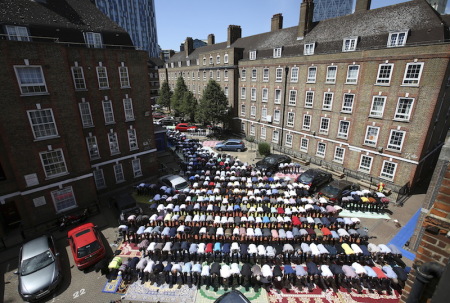Muslim Birth Rate Outpacing Christians, Will Have Largest Population by 2035: Report

A new Pew Research analysis has found that more babies will be born to Muslim mothers than mothers of any other religious group, including Christianity, by the year 2035.
Pew Research Center demographic estimates based off of input data from more than 2,500 censuses, surveys and population registers since 2009 find that even though more babies have been born to Christian mothers than mothers of any other religion in recent years, that will likely not be the case in less than 20 years.
As Pew has claimed over the last few years that Islam is expected to be the fastest growing religion in the coming decades, Pew Research analysis also claims that there are already signs indicating that such a prediction could soon become a reality.
Between 2010 and 2015, babies born to Muslims made up 31 percent of all babies born in the world. The report explains that the 31-percent figure far exceeds the 24 percent of the world's population that Muslims currently comprise.
The report also states that even though the Christian population has also continued its growth, it has done so at a more modest pace. Thirty-three percent of the world's babies were born to Christian mothers between 2010 and 2015, while Christians comprise only 31 percent of the world population.
Even though Christian populations in places like the sub-Saharan region of Africa is expected to grow in the coming years, the Pew report explains that there are areas of the world where deaths in the Christian population will outnumber births in the Christian population.
"Indeed, in recent years, Christians have had a disproportionately large share of the world's deaths — in large part because of the relatively advanced age of Christian populations in some places. This is especially true in Europe, where the number of deaths already is estimated to exceed the number of births among Christians," the report reads. "In Germany alone, for example, there were an estimated 1.4 million more Christian deaths than births between 2010 and 2015, a pattern that is expected to continue across much of Europe in the decades ahead."
According to Pew, the Christian death rate between 2010 and 2015 was 37 percent while the Christian birth rate was 33 percent. By comparison, the Muslim death rate between 2010 and 2015 was 21 percent while the birth rate was 31 percent.
Pew projects that the Muslim birth rate between 2055 and 2060 will be 36 percent, while the death rate will likely be around 25 percent during that time. As for Christians, they are projected to have a birth rate of 35 percent and a death rate of 31 percent between 2055 and 2060.
Between 2055 to 2060, Pew projects that seven out of 10 babies will be born to either Muslim or Christian mothers, while only 9 percent of all babies will born to religiously unaffiliated women.
"Globally, the relatively young population and high fertility rates of Muslims lead to a projection that between 2030 and 2035, there will be slightly more babies born to Muslims (225 million) than to Christians (224 million), even though the total Christian population will still be larger," the report states. "By the 2055 to 2060 period, the birth gap between the two groups is expected to approach 6 million (232 million births among Muslims vs. 226 million births among Christians)."
The report clarifies that just because it tallies babies born to mothers of certain religions, that doesn't mean that those babies will remain in the religion their mother is affiliated with.
"Between 2015 and 2020, Christians are projected to experience the largest losses due to switching," the report adds. "Globally, about 5 million people are expected to become Christians in this five-year period, while 13 million are expected to leave Christianity, with most of these departures joining the ranks of the religiously unaffiliated."
In total, Christians were the largest religious group on Earth in 2015, while Muslims were the second largest group. Religious "nones" were the third largest demographic, comprising 24 percent of the world's population. Fifteen percent of the global population is Hindu and 7 percent is Buddhist.
"Between 2015 and 2060, the world's population is expected to increase by 32 percent, to 9.6 billion. Over that same period, the number of Muslims — the major religious group with the youngest population and the highest fertility — is projected to increase by 70 percent," the report claims. "The number of Christians is projected to rise by 34 percent, slightly faster than the global population overall yet far more slowly than Muslims."
From 2015 until 2060, Pew expects Christians to increase from 31 percent of the world's population to just 32 percent. Meanwhile, Muslims are expected to increase from 24 percent of the world's population to 31 percent.





















